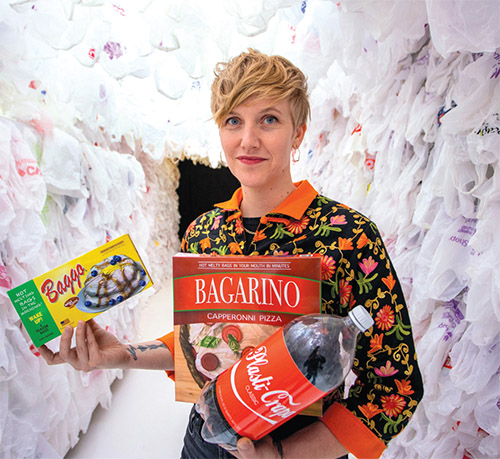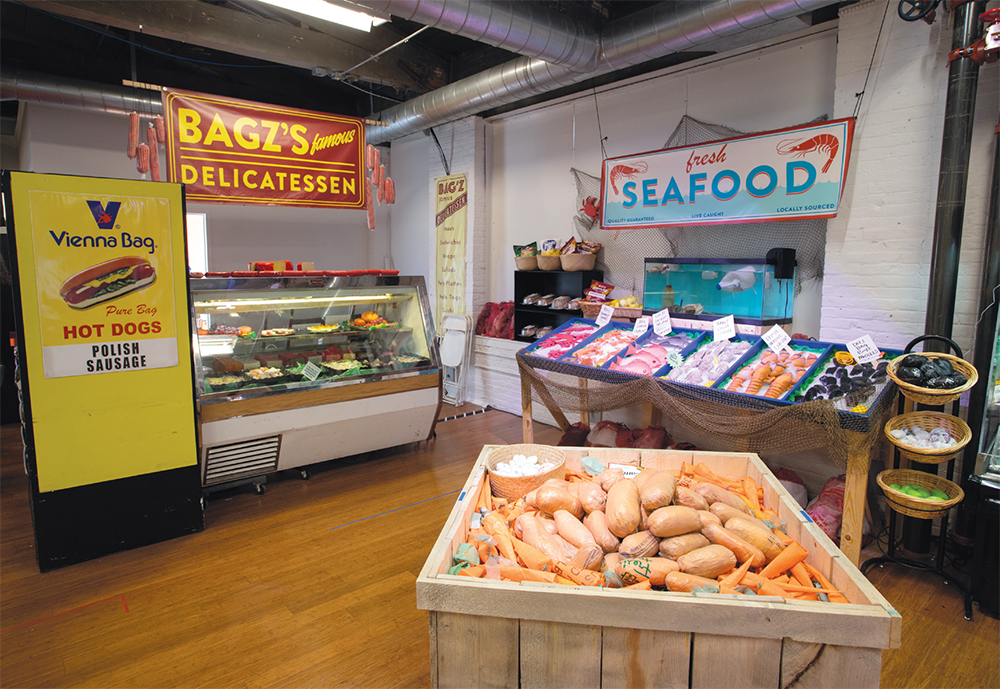Plastic Bag Love

If you hate disposable plastic bags as much as this writer, it’s difficult to share that artist Robin Frohardt has created a whole world out of them. Billed as a “tragicomic ode to the foreverness of plastic,” The Plastic Bag Store, now open at MASS MoCA, is an exuberant, hilarious, and quietly moving new exhibit whose protagonist is, yes, the humble, single-use, disposable plastic bag.
Visitors are greeted with what appears to be the interior of an average grocery store, containing everything from shelves of breakfast cereal to a freezer filled with frozen pizza. Upon further inspection, it all turns out to be fashioned from plastic—and not just any plastic—plastic retrieved from the trash, washed and given a second life here.
The illusion alone is a delight. Bulk food dispensers hold not grains and dry goods but plastic caps, toothbrushes, and medicine bottles. Again, looking closer, all the “produce”—from the organic lemons to the carrots, tomatoes and spring-mix salad—is made of plastic bags molded into familiar organic shapes. Visitors, be prepared for deeply bad puns: magazines on racks include “Bag Appetit,” “Bags Illustrated,” and “Bagmopolitan.” Other products include “Cap Tarts,” “Shredded Waste” and even “Chobagi” plain Greek “bagurt.” Plastic bag sushi? Plastic bag cigarettes? Plastic bag feminine products? It’s all here and, of course, the implied joke is that this “plastic everywhere” world is closer to reality than we would all like to admit.
If that’s all there was to The Plastic Bag Store it would be a monumental work of satire, worthy of your visit. The truth is, it’s just the beginning. After visitors are given several minutes to peruse the items “for sale,” the lights dim, and announcements are made. A squadron of assistants scurry to transform the room, guiding the audience through a series of vignettes that culminate in a true “Through the Looking Glass” experience, which we’ll not spoil for you here.
What we will share is that the narrative involves a series of short films which relate a fictional story of disposability through time: past, present and future. Lessons are learned and forgotten; each era tries and fails to communicate with the next. Finally, in a far-off and post-apocalyptic future, humans exist on a barely-habitable planet covered by ice, and survive by eating cockroaches and jellyfish. One day a scientist makes a strange discovery: an underwater treasure trove composed of a previous civilization’s precious totems and ritual objects.

Perhaps you have already guessed that the items being discovered and studied so intently are none other than our current culture’s trash: specifically, our old friend disposable plastic. Well-meaning ethnographers pronounce soda lids to be compasses, old toothbrushes to be dolls, and electric plug covers to be “sexual devices.”
The net effect is witty, humorous, and quietly sad.
As a reviewer, this writer is super biased. As the author of a recent memoir on the topic of zero waste, (Year of No Garbage, 2023), the last few years were spent learning about where all disposable plastic goes, and doesn’t go, and the experience was transformational. Once a casual environmentalist, today this writer understands disposable plastic to be a moral and ethical conundrum of our time. All of which is to say that it was especially delightful to find an artist addressing environmental concerns using playful parody and incisive satire.
Nevertheless, one may leave Frohardt’s epic installation/performance piece uncertain. Throughout one’s stay in The Plastic Bag Store, we’re swept along on the timeline of a mesmerizing parallel world. Yet what is to be made of a conclusion in which all the world’s plastic sits, seemingly harmlessly, at the bottom of the ocean? The cause of the future’s apocalypse was not entirely clear—reference is made to “Robot Wars” and other quirky catastrophes—so one is left wondering if The Plastic Bag Store was indeed a cautionary tale—or was that just what this writer wanted it to be?
